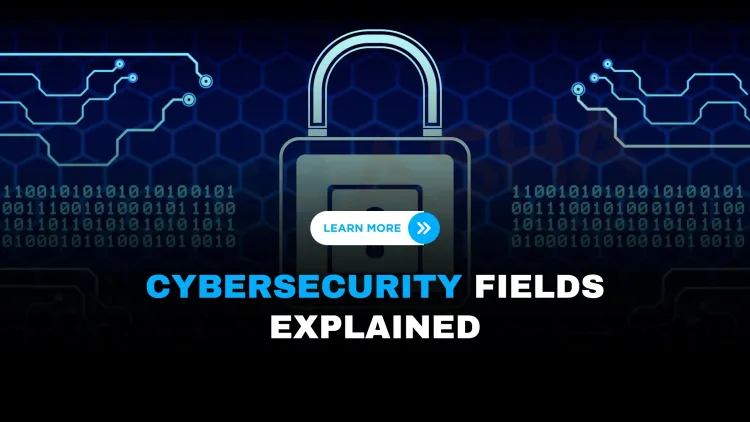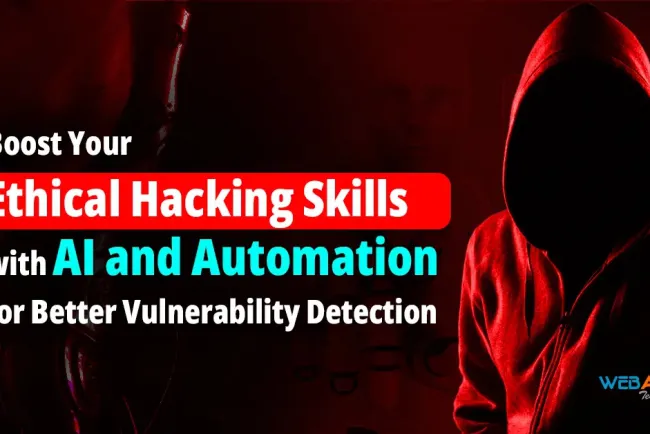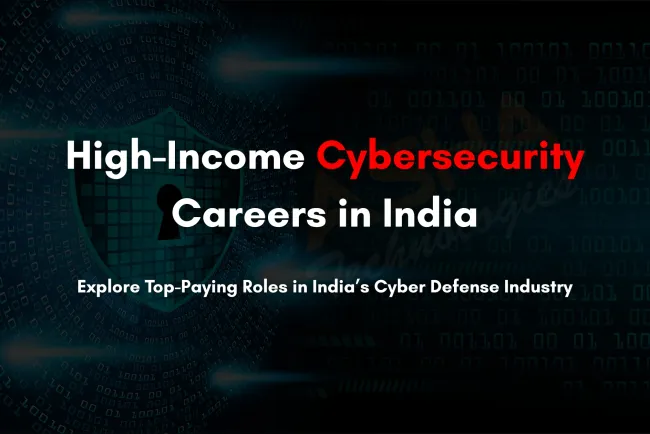What Are the Different Fields in Cyber Security? A Beginner-Friendly Guide to Specializations in 2025
Cyber security is a vast field with many areas of specialization such as network security, application security, cloud security, digital forensics, ethical hacking, SOC analysis, and more. This guide explains each field in simple terms, helping beginners understand what these roles involve and how they protect data, systems, and networks from cyber threats. Whether you’re planning a career in cyber security or just want to learn more, this blog gives you a complete overview of the various domains and what skills are needed for each.

Table of Contents
- Why Is Cyber Security Important Today?
- Different Fields in Cyber Security
- A Closer Look at Key Cyber Security Fields
- Which Field Should You Choose?
- Skills You Need for a Career in Cyber Security
- Conclusion
- Frequently Asked Questions (FAQs)
Cyber security is not just about protecting computers—it's about protecting everything connected to the internet. From your mobile phone to large company servers, cyber threats can affect anyone. That’s why the field of cyber security is made up of many different specializations, each with its own purpose and skills.
In this blog, you’ll learn about the major fields in cyber security, what they do, and why they are important.
Why Is Cyber Security Important Today?
In today’s digital world, almost everything is online—banking, shopping, social media, healthcare, and even government operations. Cyber criminals use advanced techniques to steal data, money, or disrupt systems. Cyber security experts work to stop these attacks and protect people, companies, and nations.
Different Fields in Cyber Security
Here is a breakdown of the main fields of cyber security:
| Field Name | What It Does |
|---|---|
| Network Security | Protects internal networks from outside threats like hackers and malware. |
| Application Security | Secures apps during development and after they’re launched. |
| Information Security | Protects data from being accessed, altered, or destroyed. |
| Cloud Security | Secures data, applications, and systems in cloud platforms like AWS, Azure. |
| Endpoint Security | Protects individual devices like laptops, phones, and tablets. |
| Identity and Access Management (IAM) | Controls who can access what in a system. |
| Security Operations Center (SOC) | Team that monitors and responds to threats in real time. |
| Penetration Testing / Ethical Hacking | Tests systems for weaknesses before real hackers do. |
| Digital Forensics | Investigates cyber crimes and recovers lost or stolen data. |
| Governance, Risk, and Compliance (GRC) | Ensures companies follow rules and reduce risks. |
| Malware Analysis | Studies viruses and malware to understand and prevent attacks. |
| Cyber Threat Intelligence | Tracks attacker behavior and predicts future attacks. |
| DevSecOps | Integrates security into software development from the start. |
| Incident Response | Reacts to and recovers from cyber attacks and security breaches. |
| IoT Security | Secures smart devices connected to the internet (like smart TVs, fridges). |
A Closer Look at Key Cyber Security Fields
1. Network Security
This field protects computer networks from unauthorized access, attacks, and data breaches. Tools like firewalls, intrusion detection systems, and VPNs are commonly used.
2. Application Security
Focuses on building and updating software that is secure from threats. Developers use code scanning tools, encryption, and secure development practices.
3. Cloud Security
With more companies moving to the cloud, securing platforms like AWS, Google Cloud, and Azure is crucial. Cloud security specialists manage cloud configurations, access controls, and data encryption.
4. SOC (Security Operations Center)
SOC analysts watch over the organization’s systems 24/7. They detect unusual activity, raise alerts, and respond quickly to threats.
5. Ethical Hacking
Also known as penetration testing, this role involves testing systems by hacking into them ethically to find and fix weaknesses before criminals do.
6. Digital Forensics
When a cyber crime happens, forensic experts analyze logs, hard drives, and evidence to find out who did it and how.
7. GRC (Governance, Risk, and Compliance)
This area ensures that organizations follow cyber laws, manage their risks, and create security policies. It’s vital for legal and regulatory safety.
Which Field Should You Choose?
That depends on your interests:
-
Love coding? → Application Security or DevSecOps
-
Good at analysis? → Digital Forensics or Threat Intelligence
-
Like solving puzzles? → Ethical Hacking or SOC Analyst
-
Strong communicator? → GRC or Incident Response
Cyber security offers opportunities for all types of learners—technical and non-technical.
Skills You Need for a Career in Cyber Security
✅ Basic computer and networking knowledge
✅ Understanding of operating systems like Linux and Windows
✅ Programming (Python, Bash, etc.)
✅ Cyber security certifications (like CompTIA Security+, CEH, etc.)
✅ Curiosity and a strong interest in problem-solving
Conclusion
Cyber security is a growing field with many different career paths. Whether you want to defend networks, investigate crimes, or build secure software, there’s a place for you in this industry.
Start with what excites you and grow from there. The world needs more cyber defenders—and it could be you.
FAQs
What are the main fields in cyber security?
The main fields include network security, application security, cloud security, digital forensics, ethical hacking, GRC, SOC analysis, and more.
What does a SOC analyst do?
A SOC analyst monitors network traffic and systems in real-time to detect and respond to threats.
What is the difference between ethical hacking and penetration testing?
They are mostly the same; ethical hacking is a broader term while penetration testing is a structured method of testing vulnerabilities.
Is cloud security a good career?
Yes, with growing cloud adoption, cloud security is a high-demand and well-paying field.
What skills are needed for application security?
You need knowledge of secure coding practices, app frameworks, vulnerability scanning tools, and common OWASP threats.
What is digital forensics in cyber security?
It involves investigating cyber crimes, collecting digital evidence, and analyzing devices to trace attackers.
How do I start a career in cyber security?
Start with learning basic networking, operating systems, then move to certifications like Security+ or CEH.
Which programming languages are useful in cyber security?
Python, Bash, JavaScript, and C are commonly used in security scripting and automation.
What is GRC in cyber security?
Governance, Risk, and Compliance ensures companies follow legal, regulatory, and policy-based security requirements.
Is cyber threat intelligence a technical field?
It can be both technical and analytical, involving data analysis and threat actor profiling.
What tools are used in network security?
Common tools include firewalls, IDS/IPS, Wireshark, Nmap, and VPN solutions.
What is endpoint security?
It involves securing user devices like laptops, phones, and desktops from malware and threats.
Is DevSecOps part of cyber security?
Yes, it focuses on integrating security into the software development lifecycle.
What is malware analysis?
It’s the study of malicious code (viruses, trojans, ransomware) to understand how they work and defend against them.
How important is identity and access management (IAM)?
IAM is critical to ensure only authorized people access sensitive systems or data.
Are cyber security jobs in demand?
Yes, globally there is a shortage of skilled cyber security professionals.
Can I learn cyber security without coding?
Yes, fields like GRC, auditing, and compliance need less coding and more analytical or legal skills.
What is the role of a penetration tester?
They simulate attacks on systems to find vulnerabilities before hackers can exploit them.
What are common certifications in cyber security?
Certifications include CompTIA Security+, CEH, CISSP, CISA, and OSCP.
Which field in cyber security pays the most?
Fields like penetration testing, cloud security, and threat intelligence tend to pay more.
What is the future of cyber security careers?
Cyber security is growing rapidly with more job roles and specialized areas emerging each year.
What does incident response involve?
It’s the process of detecting, analyzing, and recovering from cyber attacks.
Is IoT security a real job field?
Yes, IoT security is growing due to the rise in smart devices used in homes and businesses.
What is the importance of cyber security in businesses?
It protects business data, operations, and customer trust from cyber threats and financial loss.
How long does it take to become a cyber security expert?
Depending on your path, it can take 6 months to 3 years including study, practice, and certifications.
What is phishing and how is it prevented?
Phishing is tricking users into giving personal info. It’s prevented using awareness training and email filtering tools.
Is cyber security suitable for non-tech students?
Yes, there are many non-technical roles like policy writing, risk management, and compliance.
How can students explore different cyber security fields?
Through internships, courses, labs, workshops, and hands-on certifications.
What are the top cyber security tools to learn?
Wireshark, Burp Suite, Metasploit, Nessus, Splunk, and OSINT tools are widely used.
How is cyber security different from IT?
Cyber security is a part of IT focused purely on protecting data and systems from threats.














![Top 10 Ethical Hackers in the World [2025]](https://www.webasha.com/blog/uploads/images/202408/image_100x75_66c2f983c207b.webp)








